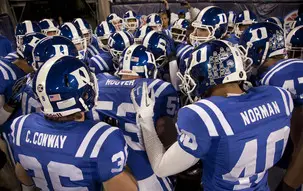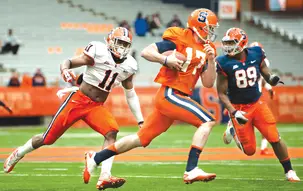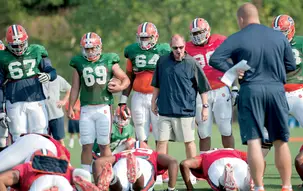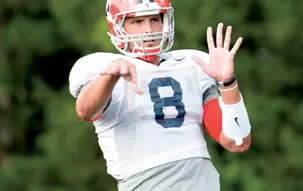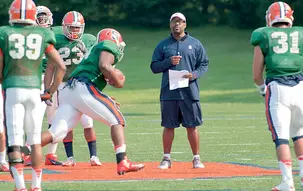The football field, his father told him, was too dangerous a place for Terrel Hunt.
It was on the basketball court, instead, where Hunt first flourished. It was on the basketball court where Hunt first earned recognition. And it was on the basketball court where, at least so far, Hunt turned in the greatest accomplishment of his versatile athletic career with a heavy heart and the memory of his late mother.
His mother, Katrina Hunt, died during his junior year of high school of complications from pancreatic cancer. His father, Darryl Dockery, died of kidney failure almost exactly one year later, the day before Hunt signed with Syracuse — to play football.
By the time he was a senior at Christ the King Regional High School, the storied basketball program in New York, Hunt was no longer in danger on the field that his father once told him he was.
By the time he was 8 years old, Hunt had convinced his father to let him play football as a defensive end.
“I just wanted to hit somebody,” he said.
He first played quarterback at age 10, but it wasn’t until he was 13, playing for the Valley Stream Hornets, that the position consisted of more than running the ball or handing it off. Two years later, he was starting for the varsity team at Christ the King on week one.
“I actually didn’t want to play quarterback, but my coach told me they get all the shine, they get all the girls,” Hunt said, “and I was like, ‘All right, I’m in.’”
The moves he had honed on the basketball court since he started playing at age 6 — the crossovers, the adept body control, the pure shiftiness — are what let him take the Catholic High School Football League by storm from day one.
“Basketball is just basically instincts,” Hunt said. “Guy comes left, you cross behind your back. It’s instinct, and that helped a lot on the football field because I was doing moves I didn’t even know I had in my repertoire.”
He dazzled Cardinal Hayes High School with his legs, scoring three touchdowns and totaling 220 yards on 20 carries. And he tallied more than 100 yards through the air.
“We knew pretty much right away that his future was football, not basketball,” former Royals head coach Chris Higgins said.
But he was at Christ the King for hoops. It takes a special player to take the floor at CK. Many of his teammates play Division I or Division II basketball, including current Connecticut guard Omar Calhoun.
Hunt’s future was in football, but his present was still in basketball. Even during his senior year, when the Syracuse-bound quarterback was at the helm, the football team went just 5-4.
As a junior, his Royals won the intersectional basketball championship in triple overtime. He didn’t enter the game until the extra frames, but drained a critical free throw with 7.7 seconds remaining to ice CK’s win.
“I was just thinking about my mom because she would’ve loved to see that moment,” Hunt said. “I knew that I was going to make that shot for her. It was a great opportunity to actually put my name out there and maximize on the opportunity when given.”
A year passed and it was more of the same for Christ the King. The Royals were back in the title game and out to a big lead. Then Calhoun fouled out. CK’s lead had shrunk and Hunt, the mop-up man playing in the last organized basketball game of his career, was on the floor to try to stop the bleeding.
He finished with 15 points on 7-of-8 shooting and hauled in a pair of decisive rebounds in the final 30 seconds of Christ the King’s win.
“You don’t want to make big mistakes, so you just go in there and you’re like, alright, playing real hesitant,” Hunt said. “But after a while you’re like, ‘This my team. We practice all the time. I’ve been here before.’”
That, he said, is what taking the field for Syracuse would be like. This is his team, and it has been for three years. Even if he’s only logged a handful of snaps, on special teams of all places, he ran with the first team in the spring and held the lead for the starting gig heading into the summer.
He and Drew Allen now split reps, but the transfer is still learning. Hunt knows what he’s doing with the Orange.
But unlike Allen, he doesn’t fit the prototype. He’s only 6 feet 3 inches compared to Allen’s towering 6-foot-5 frame.
“We’re the same, but obviously we’re different in a lot of areas,” Allen said. “But we have the same goals, the same aspirations and the same mindset.”
Hunt’s calling card in high school was his speed — he had only been playing the position for two years when he made his varsity debut — and that’s what most people still expect out of him.
He knows the stigma about black quarterbacks. They’re expected to be the run-first type, running around and making flashy plays with their legs.
He knows the perils. He’s more mature and experienced than he was as a high school sophomore. Careers for running quarterbacks are typically short-lived — “except for Michael Vick,” Hunt said, “because he’s great” — and few even come close to the level of success attained by traditional pocket passers.
The difference between his game in high school and his game now is that “I try to stay in the pocket,” he said, “because I want to be able to get my receivers a chance, instead of running like I did in high school.
“And if nothing’s open, I take off.”
He probably can’t match the rumored 70-yard bombs Allen can toss, and if he can, he hasn’t shown it yet during an open practice — though center Macky MacPherson said he has an “underrated arm” — but Hunt insists he’s more than just a runner now.
“I’ve learned to stay in the pocket and only run when I have to or run when I’m dependent,” Hunt said. “I’d rather be a pocket quarterback that just knows how to run and not just being a running quarterback all the time.”
Right now he can’t think about the competition, though. He and Allen are more similar than someone might think after taking a quick glance at them, he said.
Hunt can only keep two things on his mind: Playing like the quarterback he’s become and the memory of his mother.
“I think about her 24/7 because she’s basically pushing me every time,” Hunt said. “When I start thinking, like, ‘Man, I’m getting tired. I want them to name the starter,’ she says, ‘Don’t worry about it. Your time will come when it comes, so you just keep competing and just go at it every day.’”

